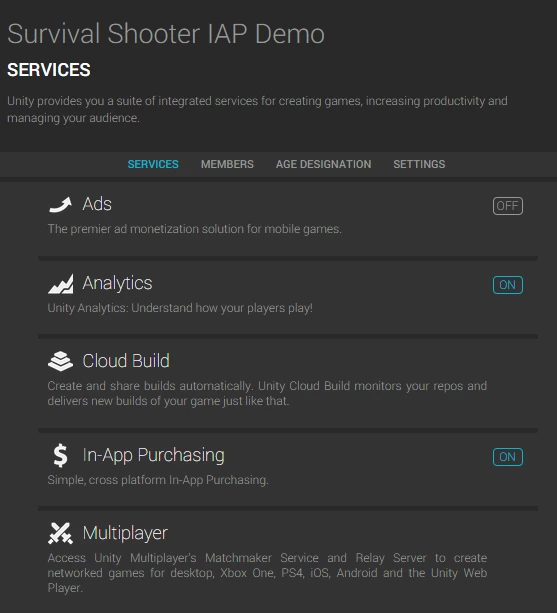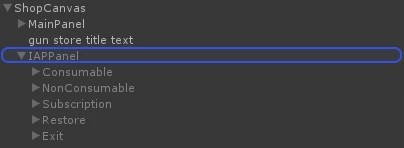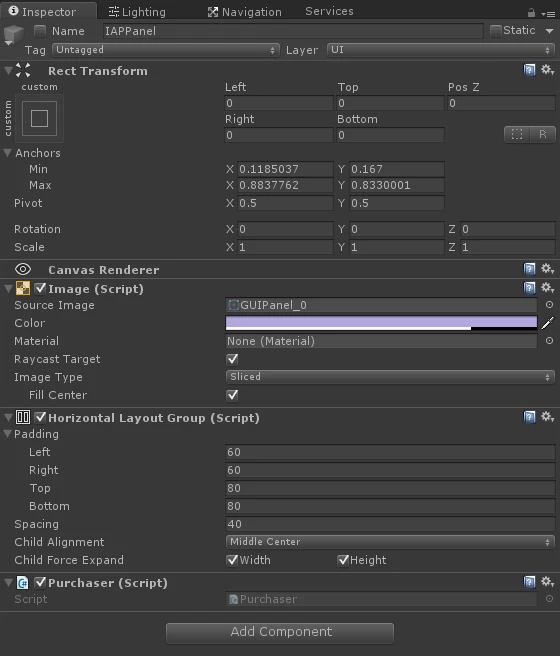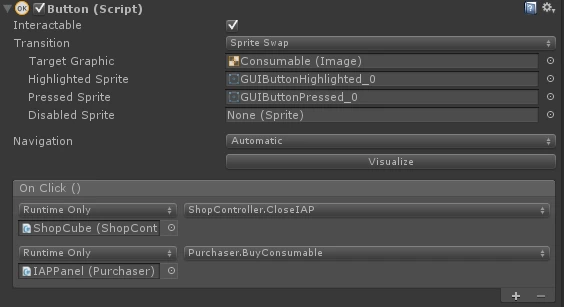Làm sao để tích hợp Unity IAP vào dự án ?
Bài đăng này đã không được cập nhật trong 5 năm
Note tích hợp Unity IAP 2d để tiện tích hợp khi cần:
Bước 1: Enable Service In App Purchasing

Bước 2: Tạo Script Purchase bao gồm các function sau:
- InitializePurchasing: Khởi tạo IAP Builder, thêm các product của game & add các callback cần thiết quản lý sự kiện mua bán.
- BuyProductID: 1 func private thực hiện việc mua sản phẩm dựa vào ID của sản phẩm mà ta khai báo ( config theo store)
- BuyConsumable, BuyNonConsumable, BuySubscription: Public function để thực hiện mua bán dựa trên loại của sản phẩm, truyền vào để lấy được chính xác ID của product.
- RestorePurchases: Trên iOS gọi hàm này để restore lại sản phẩm vừa mua trước đó.
- OnInitialize: được gọi để check xem thử app có connect được với Unity IAP hay ko, OnInitialize được chạy ngầm, chỉ fail khi chúng ta config bị sai.
- OnInitializeFailed: gọi khi IAP init có vấn đề và hiển thị log ở console
- ProcessPurchase: Check 1 sản phẩm được mua thành công & có show log ở console.
- OnPurchaseFailed: Hiển thị lỗi khi giao dịch bị thất bại ở console.
Add Script như sau vào folder source :
using System;
using System.Collections.Generic;
using UnityEngine;
using UnityEngine.Purchasing;
// Placing the Purchaser class in the CompleteProject namespace allows it to interact with ScoreManager,
// one of the existing Survival Shooter scripts.
namespace CompleteProject
{
// Deriving the Purchaser class from IStoreListener enables it to receive messages from Unity Purchasing.
public class Purchaser : MonoBehaviour, IStoreListener
{
private static IStoreController m_StoreController; // The Unity Purchasing system.
private static IExtensionProvider m_StoreExtensionProvider; // The store-specific Purchasing subsystems.
// Product identifiers for all products capable of being purchased:
// "convenience" general identifiers for use with Purchasing, and their store-specific identifier
// counterparts for use with and outside of Unity Purchasing. Define store-specific identifiers
// also on each platform's publisher dashboard (iTunes Connect, Google Play Developer Console, etc.)
// General product identifiers for the consumable, non-consumable, and subscription products.
// Use these handles in the code to reference which product to purchase. Also use these values
// when defining the Product Identifiers on the store. Except, for illustration purposes, the
// kProductIDSubscription - it has custom Apple and Google identifiers. We declare their store-
// specific mapping to Unity Purchasing's AddProduct, below.
public static string kProductIDConsumable = "consumable";
public static string kProductIDNonConsumable = "nonconsumable";
public static string kProductIDSubscription = "subscription";
// Apple App Store-specific product identifier for the subscription product.
private static string kProductNameAppleSubscription = "com.unity3d.subscription.new";
// Google Play Store-specific product identifier subscription product.
private static string kProductNameGooglePlaySubscription = "com.unity3d.subscription.original";
void Start()
{
// If we haven't set up the Unity Purchasing reference
if (m_StoreController == null)
{
// Begin to configure our connection to Purchasing
InitializePurchasing();
}
}
public void InitializePurchasing()
{
// If we have already connected to Purchasing ...
if (IsInitialized())
{
// ... we are done here.
return;
}
// Create a builder, first passing in a suite of Unity provided stores.
var builder = ConfigurationBuilder.Instance(StandardPurchasingModule.Instance());
// Add a product to sell / restore by way of its identifier, associating the general identifier
// with its store-specific identifiers.
builder.AddProduct(kProductIDConsumable, ProductType.Consumable);
// Continue adding the non-consumable product.
builder.AddProduct(kProductIDNonConsumable, ProductType.NonConsumable);
// And finish adding the subscription product. Notice this uses store-specific IDs, illustrating
// if the Product ID was configured differently between Apple and Google stores. Also note that
// one uses the general kProductIDSubscription handle inside the game - the store-specific IDs
// must only be referenced here.
builder.AddProduct(kProductIDSubscription, ProductType.Subscription, new IDs(){
{ kProductNameAppleSubscription, AppleAppStore.Name },
{ kProductNameGooglePlaySubscription, GooglePlay.Name },
});
// Kick off the remainder of the set-up with an asynchrounous call, passing the configuration
// and this class' instance. Expect a response either in OnInitialized or OnInitializeFailed.
UnityPurchasing.Initialize(this, builder);
}
private bool IsInitialized()
{
// Only say we are initialized if both the Purchasing references are set.
return m_StoreController != null && m_StoreExtensionProvider != null;
}
public void BuyConsumable()
{
// Buy the consumable product using its general identifier. Expect a response either
// through ProcessPurchase or OnPurchaseFailed asynchronously.
BuyProductID(kProductIDConsumable);
}
public void BuyNonConsumable()
{
// Buy the non-consumable product using its general identifier. Expect a response either
// through ProcessPurchase or OnPurchaseFailed asynchronously.
BuyProductID(kProductIDNonConsumable);
}
public void BuySubscription()
{
// Buy the subscription product using its the general identifier. Expect a response either
// through ProcessPurchase or OnPurchaseFailed asynchronously.
// Notice how we use the general product identifier in spite of this ID being mapped to
// custom store-specific identifiers above.
BuyProductID(kProductIDSubscription);
}
void BuyProductID(string productId)
{
// If Purchasing has been initialized ...
if (IsInitialized())
{
// ... look up the Product reference with the general product identifier and the Purchasing
// system's products collection.
Product product = m_StoreController.products.WithID(productId);
// If the look up found a product for this device's store and that product is ready to be sold ...
if (product != null && product.availableToPurchase)
{
Debug.Log(string.Format("Purchasing product asychronously: '{0}'", product.definition.id));
// ... buy the product. Expect a response either through ProcessPurchase or OnPurchaseFailed
// asynchronously.
m_StoreController.InitiatePurchase(product);
}
// Otherwise ...
else
{
// ... report the product look-up failure situation
Debug.Log("BuyProductID: FAIL. Not purchasing product, either is not found or is not available for purchase");
}
}
// Otherwise ...
else
{
// ... report the fact Purchasing has not succeeded initializing yet. Consider waiting longer or
// retrying initiailization.
Debug.Log("BuyProductID FAIL. Not initialized.");
}
}
// Restore purchases previously made by this customer. Some platforms automatically restore purchases, like Google.
// Apple currently requires explicit purchase restoration for IAP, conditionally displaying a password prompt.
public void RestorePurchases()
{
// If Purchasing has not yet been set up ...
if (!IsInitialized())
{
// ... report the situation and stop restoring. Consider either waiting longer, or retrying initialization.
Debug.Log("RestorePurchases FAIL. Not initialized.");
return;
}
// If we are running on an Apple device ...
if (Application.platform == RuntimePlatform.IPhonePlayer ||
Application.platform == RuntimePlatform.OSXPlayer)
{
// ... begin restoring purchases
Debug.Log("RestorePurchases started ...");
// Fetch the Apple store-specific subsystem.
var apple = m_StoreExtensionProvider.GetExtension<IAppleExtensions>();
// Begin the asynchronous process of restoring purchases. Expect a confirmation response in
// the Action<bool> below, and ProcessPurchase if there are previously purchased products to restore.
apple.RestoreTransactions((result) => {
// The first phase of restoration. If no more responses are received on ProcessPurchase then
// no purchases are available to be restored.
Debug.Log("RestorePurchases continuing: " + result + ". If no further messages, no purchases available to restore.");
});
}
// Otherwise ...
else
{
// We are not running on an Apple device. No work is necessary to restore purchases.
Debug.Log("RestorePurchases FAIL. Not supported on this platform. Current = " + Application.platform);
}
}
//
// --- IStoreListener
//
public void OnInitialized(IStoreController controller, IExtensionProvider extensions)
{
// Purchasing has succeeded initializing. Collect our Purchasing references.
Debug.Log("OnInitialized: PASS");
// Overall Purchasing system, configured with products for this application.
m_StoreController = controller;
// Store specific subsystem, for accessing device-specific store features.
m_StoreExtensionProvider = extensions;
}
public void OnInitializeFailed(InitializationFailureReason error)
{
// Purchasing set-up has not succeeded. Check error for reason. Consider sharing this reason with the user.
Debug.Log("OnInitializeFailed InitializationFailureReason:" + error);
}
public PurchaseProcessingResult ProcessPurchase(PurchaseEventArgs args)
{
// A consumable product has been purchased by this user.
if (String.Equals(args.purchasedProduct.definition.id, kProductIDConsumable, StringComparison.Ordinal))
{
Debug.Log(string.Format("ProcessPurchase: PASS. Product: '{0}'", args.purchasedProduct.definition.id));
// The consumable item has been successfully purchased, add 100 coins to the player's in-game score.
ScoreManager.score += 100;
}
// Or ... a non-consumable product has been purchased by this user.
else if (String.Equals(args.purchasedProduct.definition.id, kProductIDNonConsumable, StringComparison.Ordinal))
{
Debug.Log(string.Format("ProcessPurchase: PASS. Product: '{0}'", args.purchasedProduct.definition.id));
// TODO: The non-consumable item has been successfully purchased, grant this item to the player.
}
// Or ... a subscription product has been purchased by this user.
else if (String.Equals(args.purchasedProduct.definition.id, kProductIDSubscription, StringComparison.Ordinal))
{
Debug.Log(string.Format("ProcessPurchase: PASS. Product: '{0}'", args.purchasedProduct.definition.id));
// TODO: The subscription item has been successfully purchased, grant this to the player.
}
// Or ... an unknown product has been purchased by this user. Fill in additional products here....
else
{
Debug.Log(string.Format("ProcessPurchase: FAIL. Unrecognized product: '{0}'", args.purchasedProduct.definition.id));
}
// Return a flag indicating whether this product has completely been received, or if the application needs
// to be reminded of this purchase at next app launch. Use PurchaseProcessingResult.Pending when still
// saving purchased products to the cloud, and when that save is delayed.
return PurchaseProcessingResult.Complete;
}
public void OnPurchaseFailed(Product product, PurchaseFailureReason failureReason)
{
// A product purchase attempt did not succeed. Check failureReason for more detail. Consider sharing
// this reason with the user to guide their troubleshooting actions.
Debug.Log(string.Format("OnPurchaseFailed: FAIL. Product: '{0}', PurchaseFailureReason: {1}", product.definition.storeSpecificId, failureReason));
}
}
}
Bước 3:
Kéo Purchaser script vào gameObject cần test/ implement IAP.

Tạo thử nghiệm mua IAP với 1 consumable item gọi là 100 coins. Khi mua thành công sẽ được add 100 coins vào.

Chúng ta sẽ gọi function của script Purchase để mua IAP. Add thêm 1 Button vào IAP Panel & add sự kiện cho button trỏ đến function của Purchase script.

Bước 4: Testing:
Chạy game & kích hoạt màn hình cho chứa script Purchase sẽ hiển thị như này ở console log:

Nhấn vào button đã implement sự kiện mua consummer product, sẽ hiển thị:



DONE.
Để test thực trên iOS / Android thì phải config trên account của từng store. Xem thêm trên các video youtube để biết cách config như thế nào.
All rights reserved